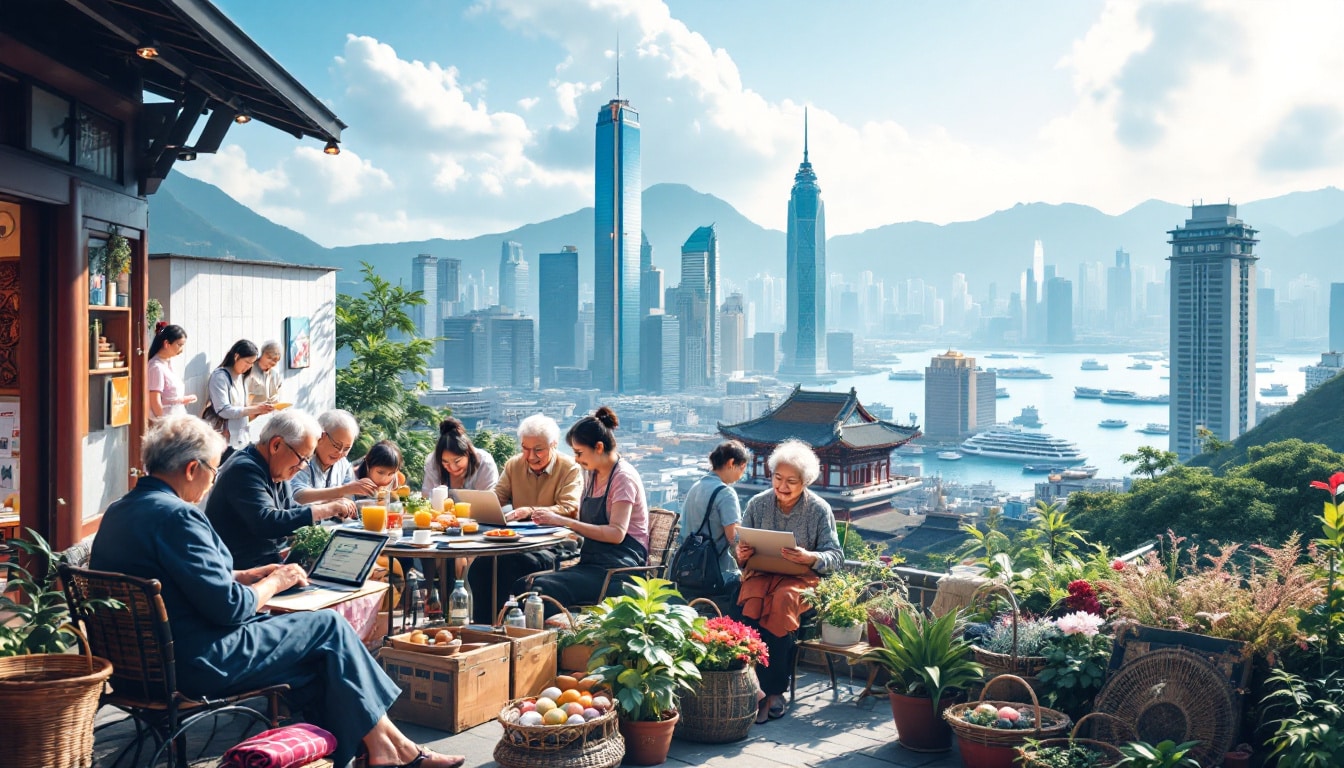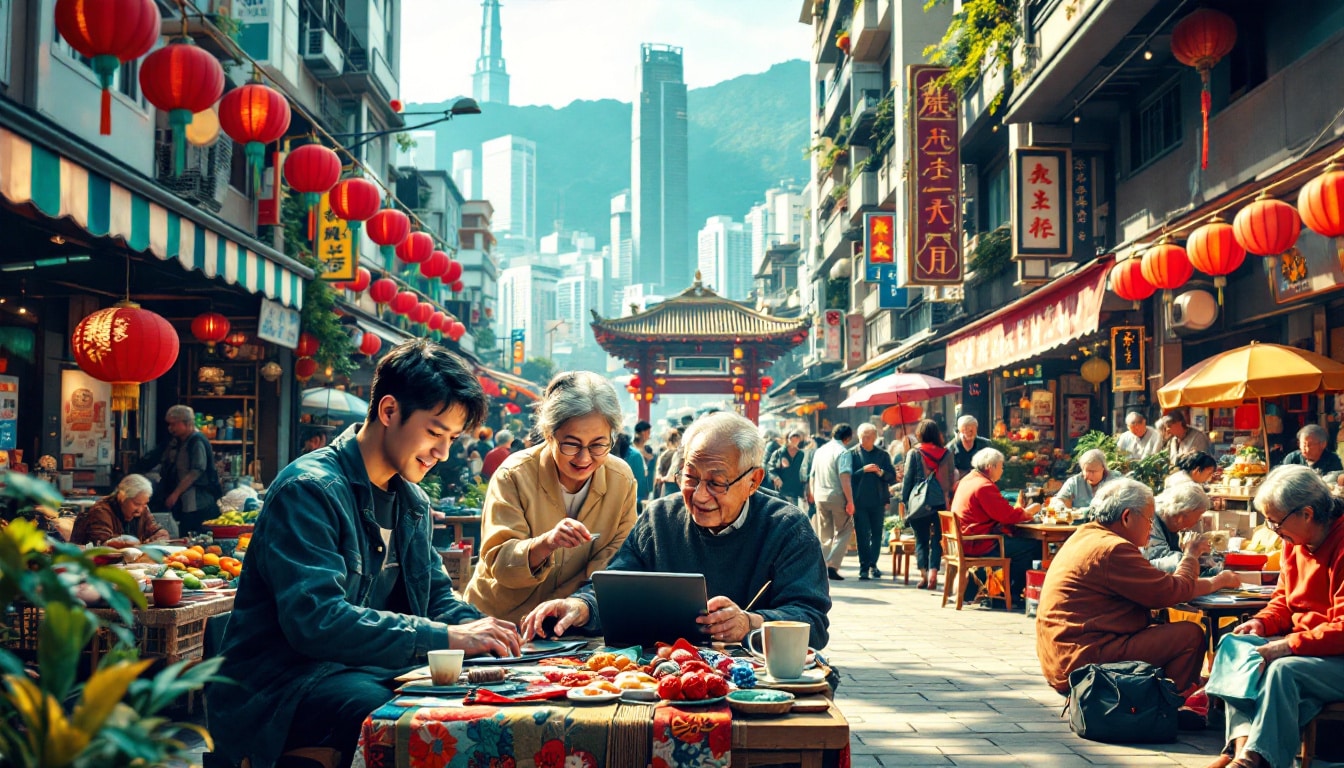Welcome to our digital universe, where every piece of data counts. We use cookies to optimize your online experience. Protection against abuse and fraud is at the heart of our priorities.
Thanks to these technologies, we can track interruptions and ensure the continuity of our Google services. Measuring audience engagement allows us to understand the use of our services and improve their quality. By accepting all options, you contribute to the development of new features and the customization of content. Our commitment to your privacy remains unwavering, with options to manage your preferences at any time.

Table des matières
ToggleWhy is the Hong Kong government stimulating the aging economy?
As Hong Kong’s population ages, the government recognizes the crucial importance of stimulating the aging economy. This initiative aims to address demographic challenges while capitalizing on the economic opportunities presented by a growing senior population. Indeed, older adults possess a wealth of experience and skills that can be leveraged to stimulate various economic sectors. Additionally, a well-structured aging economy contributes to improving the well-being of elderly citizens by providing tailored services and promoting their social inclusion.
The aging population also leads to increased health and pension-related expenses. By investing in targeted initiatives, the government seeks to balance these costs by encouraging active participation of seniors in the economy. This not only reduces the financial burden on public systems but also creates a more resilient and diversified economic environment.
In parallel, promoting the aging economy is part of a broader strategy for sustainable development and innovation. By integrating seniors into technological and creative sectors, Hong Kong aspires to become a model for an inclusive and prosperous society, where every generation can contribute meaningfully to economic growth.
What are the main initiatives to stimulate senior employment?
The government of Hong Kong has implemented several initiatives aimed at increasing the employability of seniors and encouraging businesses to hire older workers. Among these initiatives are vocational training programs tailored to the needs of older adults, which allow them to develop new skills or redirect their careers into in-demand sectors. These trainings are often subsidized or offered for free, thus reducing financial barriers to access continuing education.
Furthermore, tax incentives are provided to companies that hire seniors, thereby promoting an intergenerational workforce. This approach aims to value the experience and wisdom of older workers while integrating the new perspectives offered by younger generations. Additionally, awareness campaigns are launched to combat age-related stereotypes and promote a positive image of senior workers.
Moreover, platforms that connect employers with senior candidates are being developed, facilitating the recruitment process and reducing unemployment among older adults. These platforms offer job search tools specific to seniors’ skills and preferences, enabling them to find opportunities that match their expectations.
To illustrate these efforts, case studies show how certain companies have successfully integrated seniors into their teams, thereby improving their overall performance. These inspiring examples demonstrate the economic potential of government initiatives and encourage other companies to follow suit.
How do new technologies support the senior economy?
New technologies play a crucial role in supporting the senior economy in Hong Kong. The government encourages the adoption of innovative technologies that facilitate seniors’ daily lives while opening new economic opportunities. For instance, the development of smart homes equipped with health monitoring devices allows older adults to live independently for longer, thus reducing the pressure on traditional health services.
Moreover, advanced communication technologies enable seniors to stay connected with their families and communities, thereby fostering social inclusion. Specialized online platforms also provide remote work opportunities, allowing seniors to participate in the job market without the physical constraints related to commuting.
Artificial intelligence and automation are also leveraged to create solutions tailored to seniors’ needs, such as virtual assistants for managing daily tasks or personalized health applications. These technological innovations not only enhance the quality of life for seniors but also stimulate economic innovation, creating new market segments and specialized jobs.
Additionally, partnerships between the public and private sectors are established to develop and promote these technologies. These collaborations allow for resource pooling and accelerate the deployment of tailored technological solutions, thus enhancing the effectiveness of government initiatives.
What investments are being made in health services for seniors?
The government of Hong Kong has identified health services as an essential pillar of the aging economy. Substantial investments are made to improve the accessibility and quality of care provided to seniors. This includes strengthening health infrastructure, increasing the number of specialized professionals, and developing programs to prevent age-related diseases.
Dedicated health centers for seniors are being constructed or modernized, equipped with the latest medical technologies to provide superior quality care. These centers offer a comprehensive range of services, from medical consultations to long-term care, rehabilitation, and psychological support. The goal is to provide a holistic care environment that meets the varied needs of seniors.
Furthermore, continuous training programs are established for health professionals to prepare them to manage the specifics of chronic illnesses and age-related conditions. This training aims to ensure that elderly patients receive appropriate and empathetic care while optimizing available resources.
Telemedicine initiatives are also launched, allowing seniors to consult with doctors remotely, thus reducing commutes and facilitating access to care, particularly in rural or remote areas. These telehealth services contribute to better management of chronic diseases and provide continuous medical monitoring, improving health outcomes for older adults.
By supporting these investments, the government aims not only to improve the quality of life for seniors but also to create jobs in the health sector, thus strengthening the local economy.
What programs encourage entrepreneurship among seniors?
Recognizing the entrepreneurial potential of seniors, the government of Hong Kong has established specific programs to encourage older adults to start and manage their own businesses. These initiatives offer training in business management, marketing, and technology, tailored to the needs and capabilities of senior entrepreneurs. The goal is to provide them with the necessary tools to transform their ideas into viable businesses, thus fostering innovation and economic diversity.
Subsidies and funding are also available for older entrepreneurs, reducing financial barriers and facilitating the start of their activities. This financial aid can be used to cover initial costs such as purchasing equipment, renting premises, or developing products.
Additionally, mentorship networks are established, connecting senior entrepreneurs with industry experts and peers who have already succeeded in their businesses. These mentoring relationships provide valuable support, allowing seniors to benefit from practical advice and share experiences while boosting their confidence in their entrepreneurial abilities.
Spaces specifically designed for senior entrepreneurs are also created, offering collaborative and stimulating working environments. These spaces encourage the exchange of ideas, the formation of partnerships, and the development of innovative projects while fostering a supportive community of senior entrepreneurs.
By supporting entrepreneurship among seniors, the government contributes to a more dynamic and inclusive economy, where the experience and creativity of older adults are valued.
How does the government promote social inclusion of seniors?
The social inclusion of seniors is a priority for the government of Hong Kong, which has implemented various initiatives to ensure that older adults remain connected and active within society. Among these initiatives, community programs are developed to offer social, cultural, and educational activities tailored to the interests and capabilities of seniors. These programs aim to reduce social isolation and promote the mental and emotional well-being of older adults.
Community centers dedicated to seniors are established in different neighborhoods, providing spaces where older adults can meet, interact, and participate in various workshops. These centers offer language courses, art workshops, fitness sessions, and discussion groups, thus fostering an active and enriching social life.
Moreover, intergenerational initiatives are encouraged, facilitating interactions between youth and seniors. These programs include mentorship projects, volunteer activities, and community events where different generations can share their knowledge and experiences. These interactions strengthen social bonds and create mutual understanding between different age groups.
The government also supports awareness campaigns to combat age-related prejudices and promote a positive image of older adults. These campaigns utilize various media to highlight seniors’ contributions to society and encourage respect and recognition of their role.
By promoting social inclusion, the Hong Kong government creates a more cohesive and supportive society, where seniors can continue to contribute and thrive, while benefiting from support tailored to their needs.
What are the benefits for businesses of adapting their practices for older workers?
Adapting business practices to accommodate older workers presents numerous benefits for both the businesses themselves and the broader economy. By integrating seniors into their workforce, companies benefit from a greater diversity of experience and skills, which can lead to better decision-making and increased innovation. Older workers often bring a unique perspective and in-depth industry knowledge, which can be a valuable asset in solving complex problems.
Moreover, seniors tend to have high levels of reliability and loyalty, thus reducing turnover rates and the associated costs of recruiting and training new employees. Their long-term commitment can also contribute to organizational stability and continuity of operations.
Companies that adapt to the needs of older workers can also attract a broader talent pool, including experienced professionals looking for a flexible and respectful work environment. This is particularly relevant in sectors where specialized skills are scarce and valuable.
Furthermore, including seniors can enhance the company’s brand image, positioning it as a responsible and inclusive employer. This positive reputation can attract not only a diverse talent pool but also customers who value socially engaged companies.
By adopting inclusive practices, businesses also contribute to economic sustainability by leveraging the untapped potential of the aging population. This creates a virtuous cycle where seniors can continue to actively contribute to the economy while benefiting from working conditions tailored to their needs.
To learn more about the benefits of joining the commitment of senior-friendly employers, check out this detailed article.
How do government initiatives measure the impact on the senior economy?
To ensure the effectiveness of initiatives aimed at stimulating the senior economy, the government of Hong Kong has established rigorous monitoring and evaluation mechanisms. These mechanisms allow for the measurement of the impact of various initiatives on seniors’ participation in the economy, their well-being, and the overall economic fabric of the city. Key performance indicators (KPIs) are defined for each initiative, covering aspects such as the employment rate of seniors, the quality of health services provided, and the level of social inclusion of older adults.
Regular surveys are conducted among program participants, allowing for the collection of qualitative and quantitative data on their experiences and perceived benefits. These surveys help identify strengths and areas requiring improvement, thereby informing strategic adjustments to optimize the results of the initiatives.
Additionally, economic analyses are conducted to assess the overall impact of programs on the local economy. These analyses consider factors such as job creation, increases in seniors’ purchasing power, and the contribution of seniors to Hong Kong’s GDP. These data provide an overview of the effectiveness of the initiatives and their role in supporting the aging economy.
The government also collaborates with academic institutions and think tanks to conduct in-depth research on trends and developments in the senior economy. These partnerships allow for the benefit of external perspectives and advanced research methodologies, thereby enhancing the credibility and accuracy of evaluations.
Finally, transparency in sharing evaluation results is essential to maintain public trust and stakeholder confidence. Detailed reports are published regularly, providing a clear view of progress made and challenges to address. This transparency fosters greater accountability and encourages ongoing collaboration between the government, businesses, and civil society to achieve set goals.
What opportunities exist for investors in the aging economy?
The aging economy of Hong Kong presents numerous investment opportunities for entrepreneurs and investors looking to capitalize on this expanding segment. The market for products and services aimed at seniors is growing, encompassing various fields such as health, wellness, housing, assistive technologies, and entertainment. These sectors offer high return potential due to the increasing demand and seniors’ ability to consume continuously.
For instance, the health sector represents a particularly lucrative niche, with rising demand for home care services, advanced medical technologies, and telehealth solutions. Investing in these areas can not only generate substantial profits but also contribute to improving the quality of life for older adults.
The market for wellness and fitness for seniors is also booming, with growing demand for tailored physical activities, nutrition programs, and mental wellness services. Companies innovating in these areas can position themselves as leaders in a developing market.
Furthermore, assistive technologies, such as health monitoring devices, mobility aids, and communication platforms, offer investment opportunities in the technology sector. These innovations directly address seniors’ needs while opening pathways to international markets.
Adequate housing represents another major opportunity, with increased demand for serviced residences, senior apartments, and intergenerational living communities. Investing in adapted real estate projects can meet rising demand while generating stable long-term revenue.
Finally, the field of marketing aimed at seniors offers interesting possibilities for investors looking to develop targeted strategies and effective advertising campaigns. Understanding seniors’ preferences and consumption behaviors allows for the creation of perfectly tailored products and services, thereby maximizing return on investment.
How do public policies support the families of seniors?
Public policies implemented by the government of Hong Kong extend not only to the seniors themselves but also to supporting the families that care for their elderly relatives. These policies recognize the importance of family caregivers and aim to alleviate their burden while ensuring an environment conducive to the well-being of the elderly.
Financial allowances are offered to families to help cover home care costs, such as medical expenses, purchasing appropriate equipment, and support services. These allowances aim to reduce economic strains and enable families to provide quality care without compromising their own financial stability.
In addition, training and support programs are available for family caregivers, providing them with the skills and knowledge necessary to manage the specific needs of older adults. These training programs cover aspects such as managing medical care, effective communication, and emotional support techniques, thereby strengthening families’ capacity to offer appropriate care.
Respite services are also offered, allowing families to have free time for rest and rejuvenation. These services include daycare centers, temporary care services, and community support programs, providing families a well-deserved break while ensuring that older adults receive continuous and professional care.
Additionally, initiatives to promote work-life balance are implemented, offering working parents the flexibility needed to care for their elderly relatives. Arrangements such as telecommuting, flexible hours, and specific leave for caregivers allow families to better manage their professional and familial responsibilities.
By supporting families, the Hong Kong government creates a more favorable environment for seniors, ensuring a better quality of life for older adults while strengthening the social fabric of the community.
What is the role of the silver economy in government initiatives in Hong Kong?
The silver economy, or senior economy, holds a central place in the initiatives of the government of Hong Kong to stimulate the aging economy. This strategic approach recognizes the significant economic potential of seniors as consumers, workers, and entrepreneurs. By focusing on the silver economy, the government aims to create an ecosystem where the needs and aspirations of older adults are not only met but also where they become engines of economic growth.
Government initiatives include the development of products and services specifically designed for seniors, such as assistive technologies, adapted transportation solutions, and offerings in leisure and wellness. By targeting these market niches, Hong Kong creates opportunities for local and international businesses to meet growing demand, thus stimulating innovation and competitiveness.
Moreover, the government encourages investments in adapted infrastructures, such as senior residences and community centers, which serve as convergence points for the economic and social activities of older adults. These infrastructures provide not only essential services but also create jobs and attract investments in the real estate sector and associated services.
The silver economy is also supported by favorable tax policies and incentives for businesses investing in this sector. These measures aim to reduce entry barriers and promote the growth of enterprises dedicated to the senior economy, thereby enhancing the economic role of older adults in society.
For an in-depth analysis of opportunities offered by the silver economy in Namibia, see this detailed study.
In summary, the silver economy is an essential pillar of government strategies, enabling Hong Kong to leverage the economic and social value of seniors while creating a favorable environment for their flourishing and inclusion.
What links exist between exploiting the senior economy and the situation in Xinjiang?
As Hong Kong focuses on developing its senior economy, it is interesting to note the contrasts with other regions such as Xinjiang, where the senior economy may be exploited differently. In a detailed article, it discusses how Xinjiang primarily uses the senior economy as an economic lever, often to the detriment of the rights and well-being of older individuals. This exploitation manifests through an excessive focus on profitability, neglecting the social and human aspects that are at the heart of initiatives in Hong Kong.
In contrast, Hong Kong adopts a more balanced approach, emphasizing respect for seniors’ rights, their well-being, and social inclusion. This fundamental difference highlights the importance of establishing policies and initiatives that value older adults not only as economic resources but also as active and respected citizens within society.
This comparison highlights best practices that Hong Kong can adopt to avoid pitfalls encountered in other regions. By ensuring that the senior economy is developed ethically and inclusively, Hong Kong can serve as a model for other cities facing the challenges of an aging population.
What glimmer of hope comes from the silver economy?
The silver economy offers a significant glimmer of hope for Hong Kong’s economic future. By valuing the contributions of seniors, this economy creates a positive dynamic in which older adults are actively engaged in various sectors, thus stimulating growth and innovation. According to a in-depth article, the silver economy can revitalize traditional and emerging industries by integrating the wisdom and experience of seniors.
This integration promotes the creation of products and services better suited to the needs of an aging population while opening new market niches. For example, developing assistive technologies, personalized health services, and tailored leisure activities not only improves seniors’ quality of life but also creates lucrative economic opportunities.
Moreover, the silver economy encourages an interdisciplinary approach where collaboration between generations enriches the economic fabric. Seniors can act as mentors and advisors, sharing their expertise with younger individuals, leading to a beneficial synergy for all parties involved.
Furthermore, the increased participation of seniors in the economy contributes to a better distribution of resources and a reduction in social inequalities. This helps create a more inclusive and balanced society, where each generation can meaningfully contribute to collective prosperity.
In summary, the silver economy represents a source of hope and opportunities for Hong Kong, catalyzing sustainable and inclusive economic growth while ensuring the well-being and flourishing of older adults.
How does marketing serve the senior economy?
Marketing plays a decisive role in the development of the senior economy in Hong Kong. By adapting marketing strategies to the needs and preferences of older adults, businesses can better respond to this growing and diverse target market. A specialized article explores how smart and targeted marketing can transform seniors’ engagement in the silver economy.
Effective marketing campaigns for seniors are based on a deep understanding of their purchasing behavior, values, and expectations. Unlike traditional approaches that often target a younger audience, marketing aimed at seniors highlights messages of quality, reliability, and personal relevance. Businesses utilize appropriate communication channels, such as traditional media and simplified digital platforms, to reach this specific audience.
Moreover, relationship marketing is particularly effective for seniors, who value trust and long-term loyalty. By creating personalized experiences and offering excellent customer service, businesses can build strong relationships with their older customers, thus stimulating loyalty and word-of-mouth recommendations.
Innovations in digital marketing, such as content marketing and adapted social media, also allow for more engaging outreach to seniors. These tools help disseminate relevant information, practical tips, and special offers that directly address the needs and interests of older adults.
Finally, ethical and inclusive marketing is crucial to avoid stereotypes and promote a positive image of older adults. By highlighting inspiring stories and successes of seniors, marketing campaigns contribute to changing perceptions and valuing their role in society and the economy.
What opportunity does the new silver economy represent for Namibia?
The new silver economy offers a promising opportunity for regions like Namibia, which can leverage lessons learned in Hong Kong. According to a detailed report, Namibia can capitalize on its aging population by developing sectors dedicated to seniors, such as medical tourism, luxury residences for older adults, and advanced health technologies.
By drawing inspiration from Hong Kong’s initiatives, Namibia can implement similar programs to encourage senior employment, support entrepreneurship, and improve health and wellness services. These actions can not only stimulate the local economy but also attract international investors interested in the senior market.
Furthermore, Namibia can benefit from partnerships with experts and businesses from Hong Kong to develop appropriate infrastructures and train professionals capable of addressing the specific needs of older adults. These collaborations can accelerate economic and social development by fostering an integrated and sustainable approach to the silver economy.
By exploiting the silver economy, Namibia can also diversify its economy, reduce dependence on certain traditional sectors, and create new sources of revenue. This contributes to balanced and resilient economic growth capable of adapting to demographic and social changes.
In conclusion, the silver economy represents a strategic opportunity for Namibia, offering avenues for economic, social, and infrastructural development while improving the quality of life for older adults.
What are the benefits of joining the commitment of senior-friendly employers?
Joining the commitment of senior-friendly employers offers numerous benefits for businesses, particularly in sectors such as tourism, hospitality, leisure, and commerce. According to a specialized article, these benefits include a better brand image, greater employee loyalty, and increased company performance.
By becoming a senior-friendly employer, businesses demonstrate their commitment to diversity and inclusion, enhancing their reputation among consumers and partners. This recognition can attract loyal customers who value responsible and ethical practices.
Moreover, senior-friendly employers benefit from the wealth of experience and skills that older workers bring. These employees are often highly motivated, reliable, and possess deep industry knowledge, which can improve overall efficiency and productivity.
Commitment to seniors also fosters an intergenerational work environment, where different perspectives and experiences complement each other. This contributes to a more harmonious and innovative work climate, conducive to creative problem-solving and continuous process improvement.
Finally, by supporting senior workers, companies can reduce costs related to turnover and training new employees while reinforcing loyalty and job satisfaction. This organizational stability benefits the continuity of operations and the long-term growth of the company.
In summary, joining the commitment of senior-friendly employers offers significant benefits in economic and social terms, contributing to a more inclusive society and a stronger economy.







